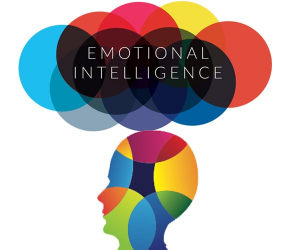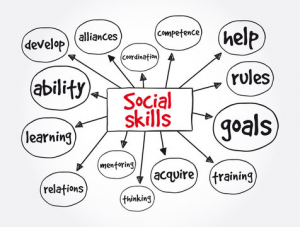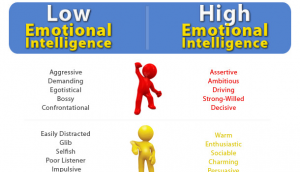Develop your Emotional Intelligence
Gone are the days when intelligence was a test result or a number on an IQ scale. Thanks to modern technology, from brain scans to social media, there is a growing perception that intelligence is more diverse than book smarts. By now you’ve probably heard the term emotional intelligence. But what does it mean to be emotionally intelligent?

Emotional intelligence (also known as “emotional quotient” or “EQ”) is the ability to understand, use and manage your emotions in positive ways to relieve stress, communicate effectively, empathize with others, overcome challenges, and resolve conflicts.
Emotional intelligence is essential for building and maintaining relationships and influencing others — key skills that help people throughout their careers and in any organizational structure.
Components of Emotional Intelligence:
Emotional intelligence is a set of skills and behaviors. While some people are naturally better at certain things, EI can be learned, developed, and improved.

The four core components of EI are-
Personal Compete – self-awareness, self-regulation,
Social Compete – social awareness and social skills.
1. Self-awareness:
Self-awareness is the ability to recognize and understand our own feelings and our impact on others. Once you are aware of your emotions and the behaviors that trigger them, you can begin to control those emotions and behaviors.

Our emotions affect our mood, behavior, performance, and interactions with other people. We all have emotions all the time – The question is whether you are aware of these emotions and how they affect your behavior and other people.
People who are self-aware tend to be more confident and creative. They also make better decisions, build stronger relationships, and communicate more effectively.
2. Self-regulation:
Self-regulation refers to how you control your emotions, behaviors, and impulses. The more aware you are, the easier it becomes; When you know how you feel and why you can respond appropriately.
If you are prone to emotional outbursts or overreactions, you can improve your self-regulation with tactics such as:
Pause before reacting: Give yourself time to stop and think before reacting immediately. It can be as simple as taking a deep breath and pausing for 20 seconds to let your emotions get in the way of your thoughts. Step Back: Sometimes you may have to leave the room and that’s okay. It’s often better to take a walk, drink water, or call a friend than make a snap decision, send a rude email, or bark at your team.
Identify Feelings: Try to write down what you feel and what caused the anxiety. You will probably start to recognize patterns. If you know what triggers you, you will be able to deal with it in a healthy and positive way the next time a similar situation arises.
By recognizing your feelings and giving yourself time to process them, you can carefully plan how you will react and avoid anything that might threaten the goodwill you have worked so hard to build.
3. Social awareness:
The third pillar of EQ is the ability to understand the feelings and actions of the people around you. To achieve a well-developed EQ, it’s not enough to be clever in your head, you need a keen awareness of the world around you. Whether it’s global and social awareness, or it means being aware of those behind you, social awareness requires you to be aware of and properly engage with your surroundings.

People with a strong social conscience tend toward kindness. But that doesn’t mean they can’t give tough feedback to others—in fact, they can give that “tough love” better because they understand the other person and want to help them improve.
It’s not about how you would feel in their situation, but rather, how they actually feel.
4. Social skills:
Social skills separate a good leader from a good one.

These skills, which include influencing, conflict management, teamwork, and the ability to inspire others, enable you to create and maintain healthy relationships in all areas of your life.
People with strong social skills can be effective in teams and organizations because they understand others and act on that knowledge to move people toward a common goal.
What are the signs of Emotional Intelligence?
Here are some signs of people with low EQ and those with high EQ.

People with low IQs-
- Often feels misunderstood.
- Get upset easily.
- Become overwhelmed by emotions.
- Have problems being assertive.
People with high IQs-
- Understand the links between their emotions and how they behave.
- Remain calm and composed during stressful situations.
- Are able to influence others toward a common goal.
- Handle difficult people with tact and diplomacy.
How to develop your IQ-
If you have gaps in your current skill set, there are actions you can take to boost your emotional intelligence. Methods include:
1. Try a diary:
At the end of the working day, reflect on how your meetings, projects, and communication went – either positively or negatively.
By writing down your thoughts, you may notice certain patterns in your own and other’s behavior and reactions.
Where did you succeed? How are your employees? Have certain people or situations frustrated you, and if so, why? The more introspective you are, the better.
2. Manage stress:
Meditation, yoga, cardiovascular exercise, and adequate sleep help you keep your negative responses in check.
3. Become a mentor:
To improve your relationship skills, sponsoring an employee (and, yes, being mentored) develops your social awareness, your leadership abilities, and your open-heartedness. Plus, seeking out colleagues with a higher EQ than yours will serve as a good example as you develop your emotional skills.
4. Learn something new:
Embracing new skills outside of the workplace rubs off in all the right ways, improving optimism, self-awareness, and your powers of observation. Try knitting, and cooking – it’ll do your career and EQ a world of good.
5. Practice Active Learning:
It’s easy to get distracted by technology, background noise, and your own thoughts. Yet, to be an effective communicator and emotionally intelligent leader, you need to be a good listener.
To become more emotionally intelligent, practice active listening. Try to focus on what the speaker is saying and show that you’re engaged by paraphrasing and using other non-verbal cues like nodding. By actively listening at work, it will be easier to connect with others and truly understand their thoughts and feelings.
6. Read the literature:
Reading literature with complex characters can improve empathy. Reading stories from other people’s perspectives helps us gain insight into their thoughts, motivations, and actions and may help enhance your social awareness.
7. Ask for feedback:
Audit your self-perception by asking managers, colleagues, friends, or family how they would rate your emotional intelligence. For example, ask them about how you respond to difficult situations, how adaptable or empathetic you are, and/or how well you handle conflict. It may not always be what you want to hear, but it will often be what you need to hear.
Building EI in yourself is one thing, but influencing others to adopt a more empathetic mindset can be a challenge.
Start making heroes of people who help other people.
“It’s not just the person who got to the top of the mountain first – it’s all the people who helped them. If you want to encourage good team behavior, recognize it, and call it out for what it is.”



